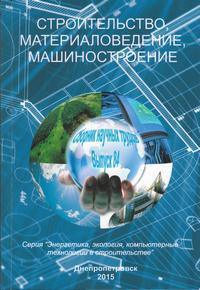Development of power machinery effective hybrid heating system cottage
Keywords:
Climate, support system, microclimate parameters, man, healthAbstract
Goal. Health and human performance largely determined by the conditions of the microclimate and air environment of residential and public buildings. In hygienic purposes it is necessary to strive to create the best indoor microclimate conditions. The development of the heating system at home - it's quite difficult but important task, which will depend entirely comfortable and cozy environment for the person. The problem of the present time, there is a steady increase in energy heating system, in connection with rising non-renewable energy sources, and our job is to ensure the normal temperature environment inside the building with the highest energy efficiency. Thus, improving the comfort in the room through the support of optimal microclimate parameters at any point in the room, aimed at improving the conditions of human life, increase productivity, reduce the cost of thermal energy to provide the parameters of the microclimate, it is an actual scientific and practical tasks of the present time.
Methods. Analysis of theoretical and experimental work with the scientific generalization; math modeling; Experimental study of the effect of microclimate on the health of the person; processing of the results of experimental studies of methods of mathematical statistics on the computer.
Results. An analysis of the theoretical and experimental data with the scientific generalization, as well as mathematical modeling studies of microclimate is planned to identify ways to determine the operating conditions of the hybrid heating system to ensure maximum working efficiency without sacrificing microclimate conditions necessary for human habitation.
The practical significance. The proposed method allows to see and evaluate the possible ways to improve the energy efficiency of the hybrid heating system.
References
Gubernskiyi Y., Korenevskaia E.I. Gigienicheskie osnovy kondicionirovania mikroklimata zhilyh I obchchestvennykh zdanii [Hygienic bases microclimate conditioning of residential and public buildings]. Moscow, "Medicine ", 1978.-192 р.
Bankhidi L. Teplovoy mikroklimat pomecheniy [Thermal indoor climate]. Moscow, Stroyizdat Publ., 1981. 248 p.
Granovskyi V. Energoeffektivnye sistemy otopleniia: tendentsii, praktika, problemy [Energy-efficient heating systems: trends, practice, problems]. AVOK, 2011.– № 8.
Chesanov L.G., Petrenko V.O., Petrenko A.O. Kachestvo mikroklimata zhilichchnoy cpedy i sistemy ego obespecheniia [The quality of the housing environment and the climate system to ensure its]. Building, materials sciences, mechanic engineering: Collection of scientific papers Issue №40 – Dnipropetrovs’k, PSАES, 2007. – p. 27-31.
Chesanov L.G., Petrenko V.O., Petrenko A.O. Sovremennye metody otsenki teploobmena cheloveka s okruzhayushchey sredoy v pomeshchenii [Modern methods of estimation of heat exchange with the environment in the room]. Building, materials sciences, mechanic engineering: Collection of scientific papers Issue №46 – Dnipropetrovs’k, PSАES, 2008. – p. 29-35.
Belikov A.S, Polishchuk C.Z., Petrenko A.O., Petrenko V.O., Kuchnir Ye.G., Polishchuk A.C. Modelirovanie i optimizatsiya mikroklimaticheskikh usloviy i parametrov sistem zhizneobespecheniya pomeshcheniy [Modelling and optimization of micro-climatic conditions and parameters of the life support systems of buildings]. Dnipropetrovs’k, Ekonomika Publ., 2013. 176 p.
Downloads
Published
Issue
Section
License
Редакція Видання категорично засуджує прояви плагіату в статтях та вживає всіх можливих заходів для його недопущення. Плагіат розглядається як форма порушення авторських прав і наукової етики.
При виявлені у статті більш ніж 25% запозиченого тексту без відповідних посилань та використання лапок, стаття кваліфікується як така, що містить плагіат. У цьому випадку стаття більше не розглядається редакцією, а автор отримує перше попередження.
Автори, в статтях яких повторно виявлено плагіат, не зможуть публікуватися в усіх журналах Видавництва ДВНЗ «Придніпровська державна академія будівництва та архітектури».
Автори, які публікуються у цьому журналі, погоджуються з наступними умовами:
- Автори залишають за собою право на авторство своєї роботи та передають журналу право першої публікації цієї роботи на умовах ліцензії Creative Commons Attribution License, котра дозволяє іншим особам вільно розповсюджувати опубліковану роботу з обов'язковим посиланням на авторів оригінальної роботи та першу публікацію роботи у цьому журналі.
- Автори мають право укладати самостійні додаткові угоди щодо неексклюзивного розповсюдження роботи у тому вигляді, в якому вона була опублікована цим журналом (наприклад, розміщувати роботу в електронному сховищі установи або публікувати у складі монографії), за умови збереження посилання на першу публікацію роботи у цьому журналі.
- Політика журналу дозволяє і заохочує розміщення авторами в мережі Інтернет (наприклад, у сховищах установ або на особистих веб-сайтах) рукопису роботи, як до подання цього рукопису до редакції, так і під час його редакційного опрацювання, оскільки це сприяє виникненню продуктивної наукової дискусії та позитивно позначається на оперативності та динаміці цитування опублікованої роботи (див. The Effect of Open Access).

